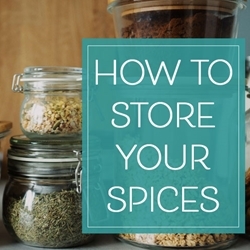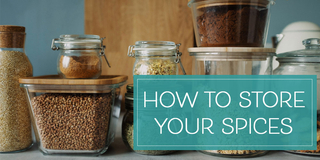How to Store Spices

Take a moment to think about your spice collection. Do you prefer to store them in a cabinet all their own or directly on the countertop? Are you a fan of organized drawers or a corner of the fridge dedicated to keeping your spices chilled? Maybe you've even continued grandma's tradition of tucking your spices away in the freezer under the assumption that they would last longer. It's time to rethink your storage methods to extend the life and flavor of your spices. Storage is critical to the lifespan of a spice, believe it or not!
I Have the Perfect Spot!
If you are a person who values convenience, storing your spices above the stove might be your first thought. In plenty of homes, there is already a nice little built-in cabinet above the stove where plenty of people toss their spices and forget about them until they decide to add a little garlic powder to their alfredo sauce. This is perhaps the worst thing you could do to your spices. Herbs, chiles, and spices alike lose flavor more quickly when they are exposed to heat. While keeping spices within reach of the stovetop seems convenient, the oils in herbs and spices evaporate when exposed to heat. Losing the oil means losing flavor. Water vapor also rises off the stovetop when you are cooking, another factor that will damage spices. When sealed in containers that aren't air tight, the moisture from the air can seep in and damage the integrity of your spices.
The spice rack on the counter isn't a good idea for those of you who like to purchase spices in bulk and then use them all year. Keeping spices out in the open like that means they are much more likely to get direct sunlight, something that can also cause spices to deteriorate faster. Herbs and spices are photosensitive, meaning they begin to break down and dry out when exposed to direct light.
Keeping them in the fridge or freezer? Freezing foods often extends the life of a product, but it can be a problem for delicate spices. Every time a jar of spice is removed from a freezer for use, condensation can occur in the jar. Where there is condensation, mold may follow. Moldy herbs and spices should be discarded immediately.
Magnetic blackboards that look adorable and provide that "casual" cooking Instagram background shot? Not such a good idea, unless they are positioned somewhere that the sun can't find them. Unless the blackboard is on the back of a cabinet door, direct sunlight affects these spice displays in the same way that it affects spices left out on the counter.
Where Should I Store My Spices?
Store your herbs and spices in a cool, dry place. The ideal temperature is one that remains fairly constant, averaging right around 70° F. Remember to store your spices away from any direct heat sources. This can be something as obvious as the stovetop, but it also includes the dishwasher, which is a source of heat that many cooks forget about. A good storage space will keep your spices dry, in the dark, and away from the heat.
Be Careful About Adding Spices to Your Cooking, Too!
It's tempting to just shake spices into your hot pot of food, and we are certainly guilty of doing this ourselves now and then, but it can affect the quality of your spices over time. By holding your spices open over the stove, you are allowing steam rising from your food to cause condensation inside of the spice containers. It's better to shake the spices into the palm of your hand or onto a spoon away from the stove, then add them to your dish.
What Should I Store My Spices In?
Some people prefer amber jars with airtight lids. Others prefer to use mason jars with airtight lids that can be easily tucked away in a drawer or cupboard. Some people just keep them in sealable bags.
If you have whole spices that have dried out, you can bring a little bit of new life into them by toasting or frying them in some oil. Ground up spices that have lost their flavor or scent can't be saved and should be discarded. If you are unsure of how long you've had the herbs and spices in your cupboard, do a quick scent test. If you can't smell it, it's time to toss it. If you can smell it but something about the spices feels or tastes off, it is better to get rid of the spice and purchase new spices. Only buy an amount that you think you can use up quickly, with 6 months being a pretty good time frame for the best tasting herbs and spices.
What Are the Benefits of Storing My Spices Properly?
The main benefit of storing your spices so they retain their freshness is you can expect consistent and flavorful results in your cooking, making your dishes more enjoyable and satisfying. Spices add depth and aroma to dishes. Proper storage safeguards their aromatic qualities, enhancing the overall culinary experience.

